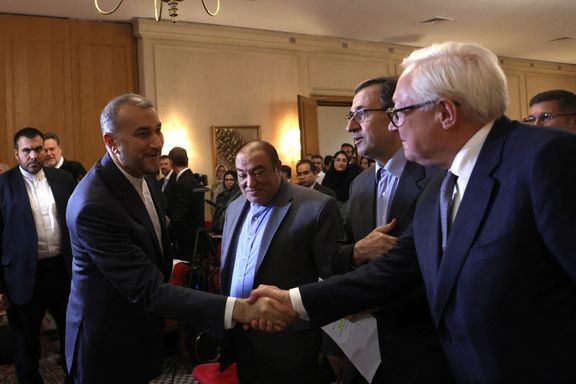Russia Slams Western Pressure On Iran Over Nuclear Issue

Russia on Tuesday aligned itself with its ally Iran in rejecting Western attempts to maintain sanctions on Iran despite the collapse of the 2015 JCPOA nuclear deal.

Russia on Tuesday aligned itself with its ally Iran in rejecting Western attempts to maintain sanctions on Iran despite the collapse of the 2015 JCPOA nuclear deal.
After a meeting between respective deputy foreign ministers in Tehran, Russia's foreign ministry said Moscow and Tehran were unanimous in believing that the failure to implement the deal stemmed from the "erroneous policy of 'maximum pressure' pursued by the United States and those who think similarly".
Russia is one of the participants in the Joint Comprehensive Plan of Action (JCPOA), the accord signed between world powers and Iran to restrict Tehran’s controversial nuclear program, especially limiting its uranium enrichment.
Then-US president Donald Trump quit the deal in 2018, imposing economic sanctions, and Iran's relations with the West have been deteriorating ever since, as it has accelerated its nuclear program. Tehran has been enriching uranium to 60-percent purity since 2021 and has accumulated enough fissile material for at least two nuclear weapons.
But Russia, which signed the deal alongside the US, China, Britain, France, Germany and the European Union, has been deepening ties with Iran since its invasion of Ukraine. Iran has supplied hundreds of kamikaze Shahed drones to Russia that have been widely used to attack civilian and infrastructure targets in Ukraine.
The war, which Russia calls a "special military operation", has driven its own relations with the West to their lowest level in decades, bringing on Western sanctions that has isolated Russia economically and politically. Iran is in a similar if not worse situation.
Reports in June indicated that European diplomats had informed Iran they planned to join the US in retaining sanctions on Iran's ballistic missile program that are set to expire in October under the nuclear deal.
They gave three reasons: Russia's use of Iranian drones against Ukraine; the possibility that Iran might transfer ballistic missiles to Russia; and depriving Iran of the benefits of the nuclear deal, which it violated after the US withdrew.
Russian Deputy Foreign Minister Sergei Ryabkov met Iranian counterparts Ali Bagheri-Kani and Reza Najafi.
Russia's foreign ministry said the meeting had emphasized "the unacceptability of any attempts on the part of the West to impose some new schemes and approaches to solving problems related to the JCPOA, which imply damage to legitimate and mutually beneficial Russian-Iranian cooperation in various fields".
It said there was still "no reasonable alternative" to implementing the JCPOA, as approved by the UN Security Council.
In recent months, many media reports have spoken of secret diplomatic efforts to control the tensions with Iran, including releasing Tehran’s frozen funds from countries such as Iraq and South Korea in return for a pledge by Iran not to further increase its uranium enrichment to weapons grade levels, which is 90-percent purity.
So far, except a US sanctions waiver to Iraq for a partial release of funds, no developments have taken place signaling an agreement. Parallel to discussions about Iran’s nuclear program, the US is also trying to secure the release of several American dual-nationals held hostage in Iran. Apparently, the release of $7 billion held in South Korea is the price for releasing the prisoners. But a new complication has emerged with reports that while talks were taking place, Tehran arrested two more individuals, bringing the total to five hostages.
Observers and media in Iran have accused Russia of using the nuclear issue for its own leverage with the West. Multilateral talks that began in Vienna in April 2021, with the Biden administration’s new policy of reviving the JCPOA, failed immediately after Russia’s attack on Ukraine.